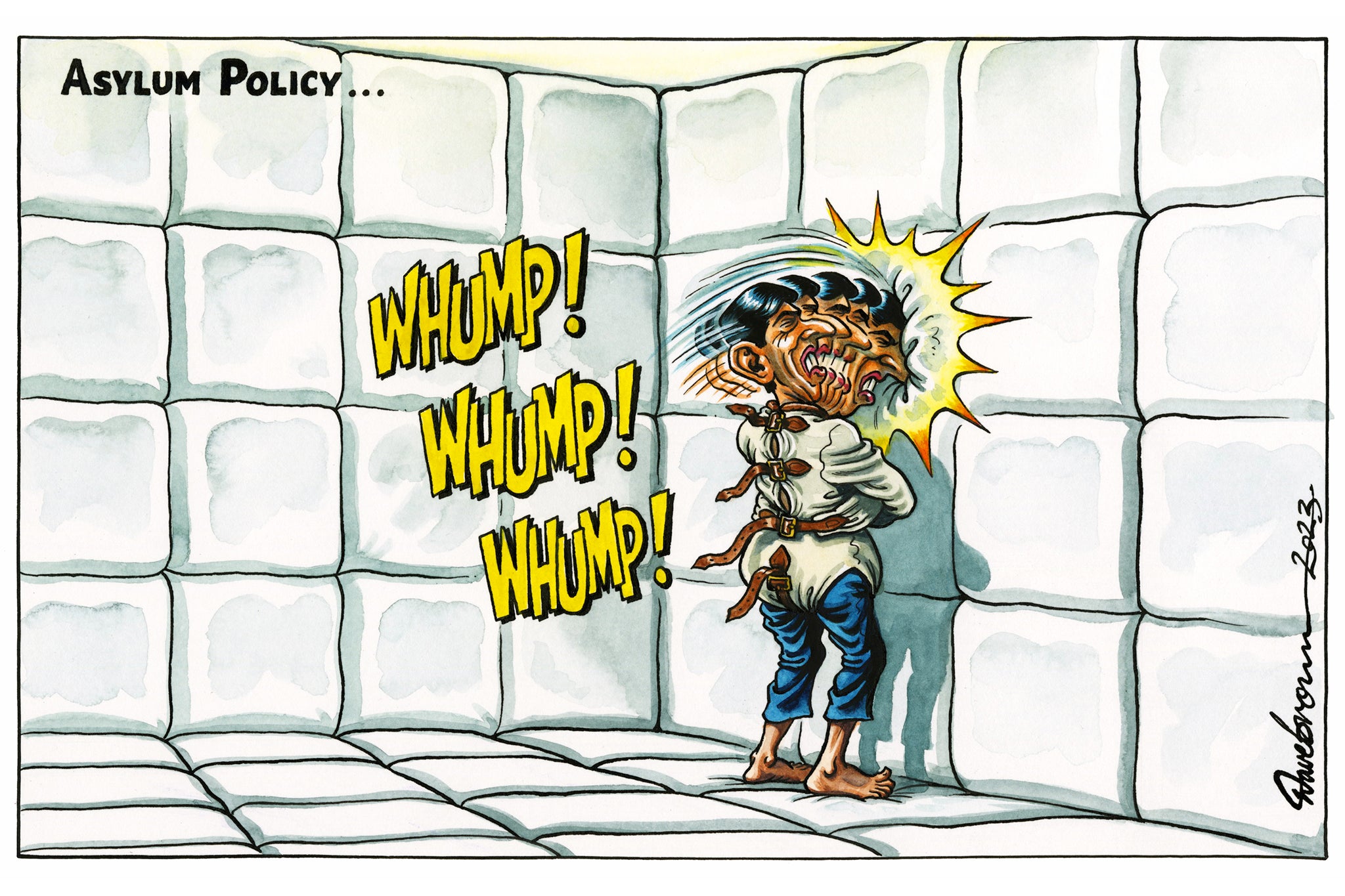How Britain’s future in the ECHR could become an election wedge issue
Human rights are not just for refugees, as Sean O’Grady explains


As many as eight members of Rishi Sunak’s government are reportedly prepared to press him into a manifesto commitment to leaving the European Convention on Human Rights (ECHR). The determination of some will be greater if British courts block the deportation of refugees to Rwanda, which has already been long delayed, to the acute embarrassment of ministers.
Some have already hinted at as much. Robert Jenrick, the immigration minister, says that “we’ll do whatever is necessary ultimately to defend our borders and to bring order to our asylum system”. Others hint at much the same off the record, while the home secretary, Suella Braverman, has expressed a “personal” view that the UK should leave the convention.
What is the point of leaving the ECHR?
Braverman is correct in saying that the ECHR is incompatible with the succession of new acts of parliament designed to “stop the boats”. She even had to declare on the face of her last bill that she could not be confident that it was lawful in terms of the Human Rights Act 1998, and many say that what the government is doing is in flagrant breach of the convention. For example, the right to claim asylum is absolute, and cannot be abrogated by domestic law.
Human rights lawyers also argue that the convention allows applicants to claim asylum in any signatory country, not just in the first safe one in which they arrive. Life for ministers would be much easier if the ECHR disappeared from their calculations. Attempts by the prime minister earlier this year to persuade the governing body of the ECHR, the Council of Europe, to stop hearing last-minute appeals were met with polite refusal. Aside from the unlikely scenario of the Council of Europe rewriting the convention, exiting it is the most logical course of action, albeit a shaming one.
What difference will it make now?
None at all in practice, if it is a mere manifesto commitment. Opinion is so divided on the matter within the Conservative Party that any move to leave the ECHR would merely create yet another split, with the possibility of a sufficiently large parliamentary rebellion by Tory backbenchers to block it.
However, others suggest otherwise. One source has briefed that “opinion in the parliamentary party has hardened considerably, as evidenced by the relative ease of passing the Illegal Migration Act. That is reflected in the cabinet.” In any case, it would take up far too much ministerial time on an issue that stirs emotions in some on the right but leaves much of the rest of the population either unmoved or bemused.
The “soft campaign” to leave the ECHR tends to attract those on the Brexiteer right who place sovereignty above all else. The ECHR, it’s worth noting, has nothing to do with the EU, despite Nigel Farage calling the campaign to renounce it “Brexit 2.0”.
Would we miss it?
Yes. Human rights are for everyone, not just refugees, and anyone who faces unfair discrimination, has their privacy invaded needlessly, is prevented from exercising their right to free speech and self-expression, or has been wrongly convicted of a crime will have cause to appeal to this external body, even if a despotic domestic administration has attempted to abolish the people’s human rights.
The Human Rights Act 1998 “brought human rights home” and established the convention in UK law, which made justice cheaper and easier to access in the British courts; but the court in Strasbourg remains there in extremis.
Does Britain need the ECHR?
Sceptics argue that Britain has always been a beacon of democracy, has fought wars to defend human rights, has no need of foreign assistance in upholding them, and indeed, has Magna Carta and the Bill of Rights as venerable defences against the abuse of power. This is why the Johnson and Truss governments tried to replace the 1998 act with a new “modern-day bill of rights”. Dominic Raab attempted to push it through parliament a number of times before Rishi Sunak finally canned the project.
The wider point is that the history of the 20th century demonstrates that even the most civilised of societies can slide into dictatorship, and the potential to call on this kind of international legal restraint can protect citizens from such a turn of events and offer them a route to redress the most egregious of offences.
Are there any other downsides to leaving the ECHR?
Two major ones. Adherence to the ECHR is built into the Good Friday Agreement and the EU-UK trade and cooperation agreement, aka the Brexit treaty. Leaving the ECHR would potentially unravel both of these binding international treaties, and would be viewed with dismay by other friends, not least the Biden White House.
What will Labour do?
Even in his present high state of alertness to public opinion, Keir Starmer would probably not feel able to countenance leaving the ECHR. He is, after all, a human rights lawyer by trade. He could fairly argue that if the government established safe and secure routes to claim asylum, and processed such claims swiftly, it wouldn’t be necessary to pursue draconian but ineffective measures such as the Rwanda plan and the refugee detention barge – neither of which is large enough to cope with any more than a few thousand people, against the 74,000 on the waiting lists for decisions.
What will happen now?
Sunak appears understandably lukewarm about getting bogged down in questions of human rights, for the time being. But as a potentially useful electoral dividing line with Labour, he may be tempted to commit the party to at least reviewing the operation of the ECHR in the next Conservative manifesto. That will be enough to stoke up the issue without any firm commitment whatsoever.






Join our commenting forum
Join thought-provoking conversations, follow other Independent readers and see their replies
Comments